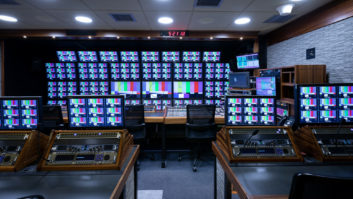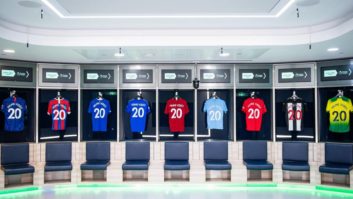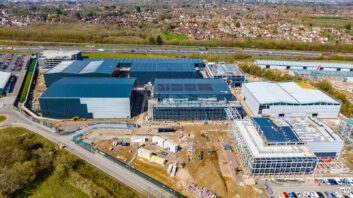
The UK’s reputation in the movie business precedes itself, boasting a mastery of unrivalled production values coupled with a cost advantage over its Hollywood counterparts. From the grand Pinewood and Shepperton to the bustling Leavesden and the once-mighty yet intimate Ealing, these illustrious studios have taken lots of business from Tinseltown giants over the years.
A new addition to that distinguished list is Shinfield Studios, a colossal expanse of 120 acres (with the potential to take more) and 1M. sq ft, strategically nestles along the M4 corridor, a few miles from Reading.
The brainchild of former Pinewood Shepperton commercial director, Nick Smith, Shinfield was initially a reaction to the lack of space afforded streamers owing to the fact so many big budget movies were taking the space.
Now, just finishing the second of a five-phase construction programme, it’s taking orders on the scale of the aforementioned competitors. “We’re not focused on any particular area,” Smith tells TVBEurope. “We’re able to take the biggest global productions around. Streamers and features are welcome.”
Shinfield has just started on its fourth production with two others winding up. Smith explains how it’s “a real achievement” in what has been a very short existence to date.
“Phase one only finished in Autumn 2021 and the site has been fully used up until now,” he says. “Phase two is made up of four phases due to the scale of the project with phases 2A and 2B both opening at the end of June. Phase C will be open in September and deliver another four sound stages and the whole of phase two will be completed in February next year.”
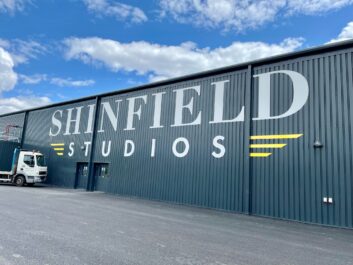 Upon conclusion of Phase Two, Shinfield will boast an impressive total of 18 sound stages, nine of which are currently available for immediate use. Among the grandest is Stage Three, nearing completion: a colossal, 42,000 sq ft stage and being fully soundproofed and fully air-conditioned with 50 feet to the working gantry it makes this soundstage one of the UK’s largest.
Upon conclusion of Phase Two, Shinfield will boast an impressive total of 18 sound stages, nine of which are currently available for immediate use. Among the grandest is Stage Three, nearing completion: a colossal, 42,000 sq ft stage and being fully soundproofed and fully air-conditioned with 50 feet to the working gantry it makes this soundstage one of the UK’s largest.
“We didn’t want to cut corners,” Smith adds. “I’ve worked on soundstages around the world where budgetary issues meant we had to cut corners. I said with Shinfield, we’re either going to do it properly or not at all.”
However, do not let the two-year purple patch fool you into thinking it’s been an easy process. It took nearly six years to secure the land and get the project to where it is today that is set to house the UK’s fourth largest studios.
“We probably spent the first couple of years just looking at different sites – not because there were many, but quite the opposite. “It was hard to find a site within the designated area – close to London – with 100 hundred plus acres that allowed us to build what we wanted,” Smith adds. “We looked around north London and here, weighing up all the pros and cons. Then we saw they were upgrading the M4. The Elizabeth Line comes out to Reading Green Park station, which has just opened. “We looked at the crew data bases and lots live on the M4 corridor between Slough and Reading, so it trumped anything we found in north London.”
Moreover, the purpose-built studio enables it to provide facilities and services that older ones simply cannot match. “With modern technology at our disposal, which might prove challenging to incorporate into older structures, we have the advantage of concrete aprons between stages, allowing convenient parking for vehicles,” explains Smith. “Unlike other studios that lack such features due to their original construction limitations, our facility was designed with this functionality in mind.”
Nevertheless, amidst the marvel of this state-of-the-art studio construction, a tense atmosphere pervades the film industry, as writers and actors in Hollywood united in a profound strike. While an immediate solution remains uncertain, Smith maintains a pragmatic outlook on the situation.
“It’s not a great time because it’s has meant there’s a significant production hiatus,” he says. “However, I look at it with my glass half full hat on in that it would be even worse if we finished everything this year and then in 2024, when we’re ready to go, the industry goes on strike.”
Shinfield’s green credentials also make it stand out against the other film studios. Nothing is powered by gas, solar panels have been installed and there are air source heat pumps peppered across the complex.
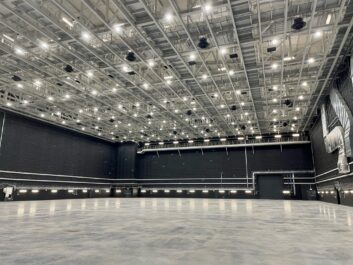
“We’ve tried to think about it in an innovative way but still give the producer what they need,” Smith says. “We try to be as green as we can, full in the knowledge that the productions require a lot of power. We’ve been surprised when we turn on the biggest stage and see the air-con only uses up 50 per cent of the energy we were told we would burn. We’re greener than we thought we were going to be at this point.”
AI has started to gain traction in the movie business in recent years, but Smith says it’s too early for Shinfield to be thinking about that right now. “Everybody is still talking about video walls, so that’s how it’s going to be for the foreseeable. That said, we will adapt when the time comes.”
Although the sound stages are slated for completion within the first quarter of next year, that doesn’t mean the construction will come to an end. Building the media hub and commercial space that will be leased out to production houses, facilities companies and edit suites will run through 2025.
What’s more, the Berkshire Skills Cluster funds that Shinfield secured, with its partners, must go on training and education. “It won’t happen overnight; you need to train people over the years but it’s ripe to bring people into the business,” adds Smith. “Lots of locals will work here.”
For now, Shinfield is an impressive work in progress.


